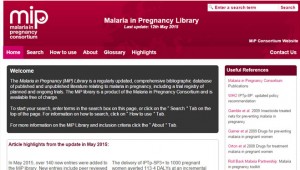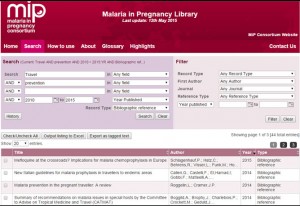Most people know that children are at particular risk from malaria, a disease caused by a parasite that is transmitted by mosquitoes. Malaria is a major cause of death among children in sub-Saharan Africa. However, it is less known that malaria in pregnancy can have equally devastating consequences both to the mother and developing fetus. During pregnancy a change in a woman’s immune status occurs to allow the fetus to develop. In addition, a new organ, the placenta, develops to feed the fetus.
The placenta provides a perfect site where malaria can “hang out,” avoiding clearance by the body’s normal immune defenses. As a result, pregnant women living in malarious areas have an up to 50% higher risk of carrying malaria parasites compared to their non-pregnant counterparts. The consequences for the woman and the developing fetus(es) can range from mild to severe, or life threatening, depending on her exposure to malaria during her lifetime. In areas where malaria is common (i.e. year round transmission) and pregnant women have developed some malaria immunity, pregnant women are more likely to be anaemic, and their pregnancy can be at risk of miscarriage or stillbirth, or infant low birth weight or preterm delivery.
In areas where malaria is less common and highly seasonal, the pregnant woman is at risk of severe life threatening illness. The prevalence of malaria in pregnancy is much higher in adolescent women aged 15–19 years and women who are pregnant for the first time, and decreases with each subsequent pregnancy. The disease is also much more prevalent in HIV-infected women, regardless of the number of times they have been pregnant.
 Malaria prevention and prompt treatment is essential to reduce the adverse consequences of malaria during pregnancy. The Malaria in Pregnancy Consortium is a multi-disciplinary group of research institutions working together to improve and find new treament and prevention strategies. In 2006, it launched the Malaria in Pregnancy Library with the aim of providing an open access, comprehensive bibliographic database of published and unpublished literature relating to malaria in pregnancy, including a trial registry of planned and ongoing trials. The library currently contains about 7200 entries.
Malaria prevention and prompt treatment is essential to reduce the adverse consequences of malaria during pregnancy. The Malaria in Pregnancy Consortium is a multi-disciplinary group of research institutions working together to improve and find new treament and prevention strategies. In 2006, it launched the Malaria in Pregnancy Library with the aim of providing an open access, comprehensive bibliographic database of published and unpublished literature relating to malaria in pregnancy, including a trial registry of planned and ongoing trials. The library currently contains about 7200 entries.
The Malaria in Pregnancy library is available free of charge. The library is updated every 4 months, using multiple sources to ensure that information is as comprehensive as possible. The front page presents key highlights from the most recent update. Over the years, the library interface has been upgraded to make it a user-friendly resource for systematic searches of the literature.
The library is an excellent source of information, not only for scientists studying the epidemiology and immunology of malaria in pregnancy, but also for those interested in prevention of malaria in pregnancy when travelling; the library contains at least 300 entries related to ‘travel medicine’. In this example (screen shot) of a library search, we looked for articles related to travel and malaria prevention in pregnancy for the last five years. Note that the search terms “Pregnancy” and “Malaria” are not needed, and that the output can be downloaded in an excel format or in a format for use in a reference program, such as Reference manager or Endnote. Search histories are saved and can be combined. Clicking on an entry in the list will bring a pop-up screen with the abstract and URL link (if applicable) to the article.
 The malaria in pregnancy library is also an excellent resource for systematic reviews on all aspects of malaria in pregnancy. Examples of such reviews include a review on malaria and iron status during pregnancy in malarious areas by Sangare et al (2014), or women’s access and healthcare provider adherence the World Health Organization’s policy for the case management of malaria in pregnant women by Hill et al (2014).
The malaria in pregnancy library is also an excellent resource for systematic reviews on all aspects of malaria in pregnancy. Examples of such reviews include a review on malaria and iron status during pregnancy in malarious areas by Sangare et al (2014), or women’s access and healthcare provider adherence the World Health Organization’s policy for the case management of malaria in pregnant women by Hill et al (2014).
For those who just want to check out the library, or find specific literature for a study project, or simply to know more about malaria in pregnancy, the Malaria in Pregnancy Library is available for you 24 hours a day, 7 days a week.
Leave a Reply
You must be logged in to post a comment.